No CrossRef data available.
Article contents
The First English Translation of Wieland's Oberon
Published online by Cambridge University Press: 02 December 2020
Abstract

- Type
- Comment and Criticism
- Information
- Copyright
- Copyright © Modern Language Association of America, 1942
References
Note 1 in page 576 See “A Note on Cutting and Slashing,” MLR, xxxi (1936), 393–395.
Note 1 in page 576 J. L. Haney, “German Literature in England before 1790,” Americana Germanica, iv, 130–154. Georg Herzfeld, William Taylor von Norwich (Halle, 1897) and “Zur Geschichte der deutschen Litteratur in England,” Herrig's Archiv, cv, 30–36. V. Stockley, German Literature in England 1750–1830 (London, 1929). Wm. A. Colwell, German Literature in England 1750–1800 (Harvard Ph.D. Thesis. 1906. On file in Harvard Library).
Note 2 in page 576 Oberon. Translated from the German of Wieland by John Quincy Adams, Edited by A. B. Faust (New York: Crofts, 1940).
Note 3 in page 577 MLN, xxii, 95. Also Schnorr's Archiv, xiii, 503–506. Also Böttiger, Litterarische Zustände und Zeitgenossen, ii, 92.
Note 4 in page 577 Deutsches Museum, ii, 232–247.
Note 5 in page 577 Besides the translation of Eschenburg's Elegie which appeared June 1782 in the Deutsches Museum, Six's translations of two odes of Count Leopold Stolberg were published in the Deutsches Museum for Sept. and Oct., 1872. They were also printed in the Gentleman's Magazine for April, 1784.
Note 6 in page 578 Miss Stockley in her German Literature in England 1750–1830 (p. 93) declares: “There are cases where Six quite misses the point—e.g.:
is not
(Canto lv is a mistake. It should be Canto ix, stanza 58.)
To be sure, this translation is not literal. It is hard to see how a metrical version could be. But there is no “missing of the point.” The context clearly shows a “refuge of calamity.” Alphonso finds refuge, after his fall from favor at the court, in his humble cot; but the plague sweeps away his three sons, grief kills his wife, and his only friend proves untrue. Certainly this justifies the line “His cot, that refuge of calamity.”
Though Six varies often from the literal he makes few mistakes. In stanza 58 (Canto viii, stanza 20 in modern editions):
Six translates: “The springs that pour'd its nourishment are dried.” He seems here to have mistaken the reference of the pronoun seine and so has forced the meaning “nourishment” from Freuden to prolong the figure (a tree) of the preceding line.


